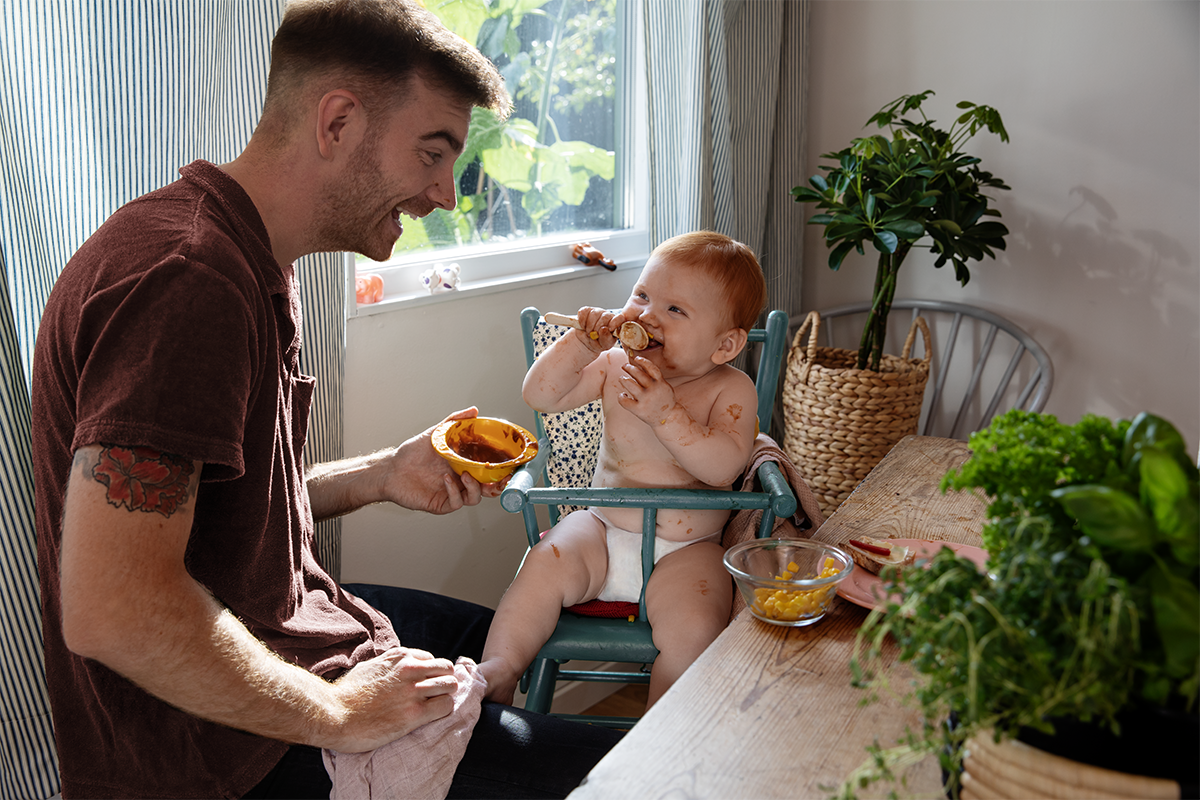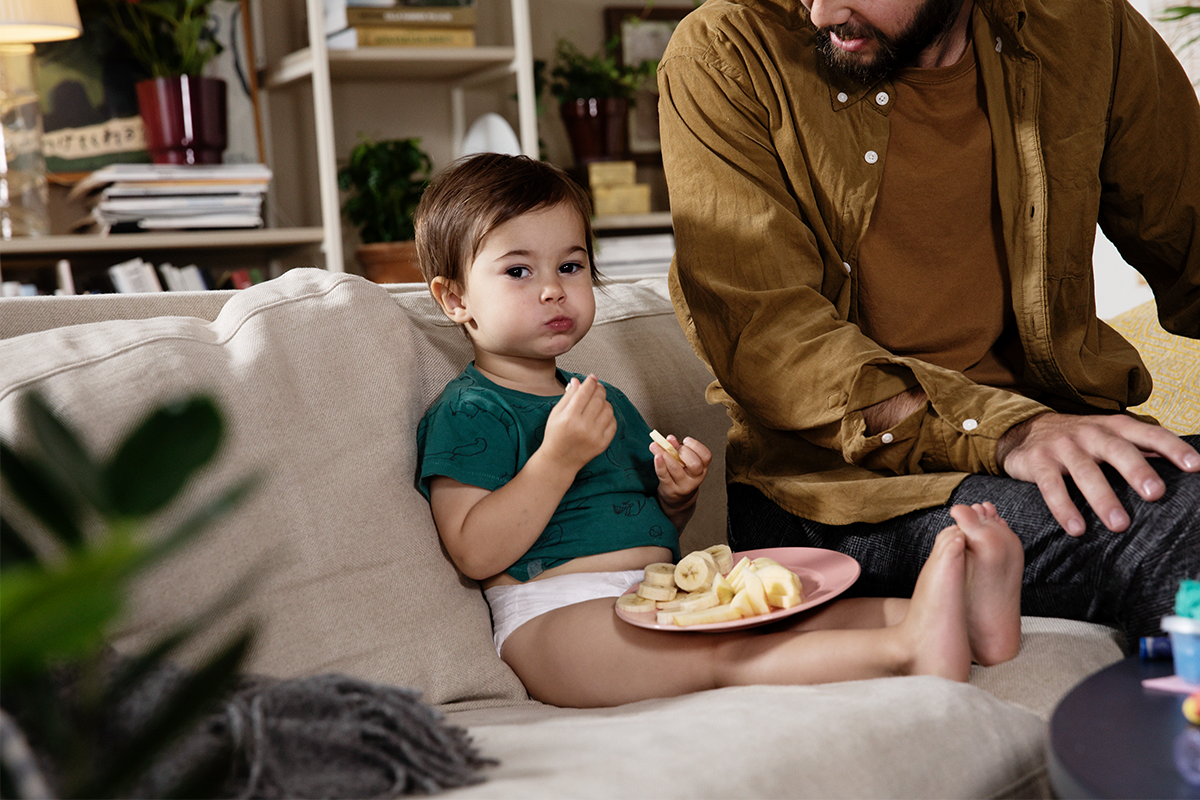20 great tips on babies and food
There are plenty of myths and ideas out there about babies and food – and sometimes, guidance and recommendations change. That makes it tricky to keep track of what really applies. When can babies eat honey? And what do you need to know about feeding them eggs, nuts and spinach? Here, we’ve compiled a list of 20 helpful tips about babies and food.
- Little tastes from four months at the earliest
For the entire first six months of life, your baby’s nutrients should come from breast milk or formula. But it’s not a bad idea to start introducing food to your baby as little tastes from four months of age. And it’s important that any food you feed a baby under six months of age is soft, and in teeny-tiny quantities – just a little nibble, so that your baby gets familiar with the flavour and consistency. - Let your baby try a wide variety of flavours early on
It’s good to let your baby try lots of different flavours from the start – because a varied diet is important for well-functioning intestinal flora and better health. You can read more about this in our interview with paediatrician Carina Saunders, who researches the importance of food for children’s health and immune system. In addition, younger children tend to be more open to new tastes than older kids: by age two, it can already be harder to offer new kinds of foods, and this period can last for a long time. So take the opportunity to introduce lots of new flavours, and you might avoid having a picky eater later. - Introduce eggs and peanuts before six months and reduce the risk of allergies
Parents used to commonly be advised against feeding peanuts to children under one year of age, because peanuts are an allergen. But that guidance has changed and we’re no longer advised against giving peanuts to babies under a year now. In fact: research shows that introducing peanuts early can actually reduce the risk of allergy. However, do keep in mind that peanuts could get stuck in the baby’s throat, so offer your baby smooth peanut butter instead. The latest research also shows that introducing eggs early can reduce the risk of allergy by up to 60%. More research in the area is still needed, but there is plenty to suggest that it’s wise to let your baby try eggs and peanut butter in small tastes before six months of age. - Introducing gluten during the first year
It is good to introduce gluten in small amounts as soon as your baby starts to eat solid foods; then you can gradually pick up the pace. One idea is to offer bread products that also contain oats, which will automatically have less gluten. Even if you are gluten-intolerant yourself, introducing gluten to your baby during the first year of life to reduce the risk of Coeliac disease is the right thing to do. - Don’t give up!
Is someone spitting everything out? Don’t give up. Keep trying to launch new tastes into that little mouth, over and over – even if it takes ten times or more – because eventually, your baby might think the new food is all right. It’s not unusual for babies to take a long time to get used to new flavours. - A little salt isn’t dangerous for babies
No, a little salt is not going to harm your baby’s kidneys. If you want to give your baby a taste of your salted mashed potatoes, that’s totally fine. But large quantities of salt isn’t a good idea for babies or adults. - Iron-fortified foods for infants
Iron is important for infants because they are growing so much, but it’s often hard to make sure they get enough through regular food. So it’s a good idea to feed them iron-fortified baby foods, such as the porridge you buy at the store – just take a look at the packaging. If you would rather not buy ready-made baby food, you can mix an iron-rich food into home-made porridge. - Babies need extra fat
Because babies grow so quickly, they also need a little extra fat in their food. So if you prepare home-made food, it’s a good idea to add an extra spoonful of olive oil or a little butter. You should also look for the nutritious omega-3 fats found in fatty fish and canola oil. If you use store-bought baby food, this extra fat is already taken into account and you don’t need to add more. - Go easy on milk products the first year
Milk is nutritious, to be sure, but it contains very little iron – which little growing babies need plenty of. So it’s wise to wait to feed your baby milk or yoghurt in larger quantities until one year of age, simply because you don’t want to fill them up on milk products instead of other more iron-rich foods. That said, you can offer cheese, and you can use milk or cream in cooked foods. Unpasteurised milk may be dangerous for babies, but this kind of milk is not sold in ordinary grocery stores. - Skip the sugar and sweetened foods – as long as possible
One tip is to avoid sweet foods, like juice, until the day your child requests it (or longer, depending on where you stand on the issue). If your baby gets a taste of sweet drinks and purées, there’s a high risk that they’ll lose interest in tasting anything else. - When can babies eat honey?
Honey should not be given to babies under a year of age because it may contain a kind of bacteria that can be toxic to infants (infant botulism). The reason babies are so sensitive is because their intestinal flora isn’t fully developed yet. Infant botulism is very rare and mainly affects infants under six months of age – but just to be safe, the general recommendation is not to give honey to babies under one year old. - Avoid large amounts of spinach and arugula until babies are at least one year old
Spinach and other leafy greens are high in nitrates, so it’s a good idea to be mindful not to feed too much to babies under a year old. Of course, overconsumption of spinach doesn’t tend to be a common problem among toddlers, but it’s still good to be aware. On the other hand, it is a good idea to try to get babies to taste lots of other vegetables early on. The earlier something becomes a natural part of what they eat, the easier it will be for them to accept. - Green or damaged potatoes can make you sick
Don’t let kids (or adults) eat green or damaged potatoes, because they contain toxic substances that can make you really sick. For the same reason, it’s smart to always peel all potatoes, even new potatoes, that children under a year of age will be eating. - Keep track of how much rice you feed your baby
Baby food with rice has been shown to potentially contain very small quantities of arsenic. It’s fine if your baby likes rice porridge, but change it up with other varieties and switch between brands. - Water offers babies no nutrients
During your baby’s first six months, thirst is quenched with breast milk or formula. If it’s very hot out, it’s a good idea to be extra generous with breast milk or formula. Water has no nutrients, and you can wait to give your baby water until they start eating real food. - A high-fibre diet can lead to constipation or diarrhoea
Feeding babies fibre-rich foods is good, but introduce them gradually. Before the stomach has gotten used to it, fibre could cause trouble for the gut and give your baby diarrhoea, or the reverse: it could result in constipation if your baby doesn’t have enough to drink. If you feed porridge, check the package and choose one intended for the appropriate age, since the fibre content in porridge is higher when it is for older babies. - Do not re-heat food your baby has tasted
Babies are more sensitive to bacteria in food than adults are. So don’t save leftovers that you or your baby have already tasted. Instead, feed a little at a time, in small portions, to avoid unnecessary food waste. - Don’t compare your baby’s food habits to others’
As we know, all babies are different – and that’s also true of food habits. How much they enjoy a new little taste and how quickly you can pick up the pace with bigger portions varies from one baby to the next. Of course, it’s never wrong to talk to other parents about their own approaches with their little ones, but it’s important to always begin from your baby when it comes to food. If they seem satisfied and gain weight as they should, you can relax, even if they are eating more or less than other babies you know. - Get messy and make food joyful!
Let your baby make a mess with food! They’ll be delighted to eat, and the mouth is actually an important part of how babies explore the world. We know it can hurt a little to see mashed potatoes smeared across half a cheek, but you really don’t have to wipe their mouth after every bite. Instead, be patient and use a big bib – and maybe change baby’s clothes after the meal. - Shared food habits
Eat with your baby, preferably with the whole family. Model for your baby that food is delicious and fun, and that mealtime is about more than just eating – it’s also about being together and talking. It’s a good habit already now to avoid talking about dieting when you’re with your baby – food shouldn’t have to be negative or charged.
Please note that all information above is based on Swedish recommendations.


